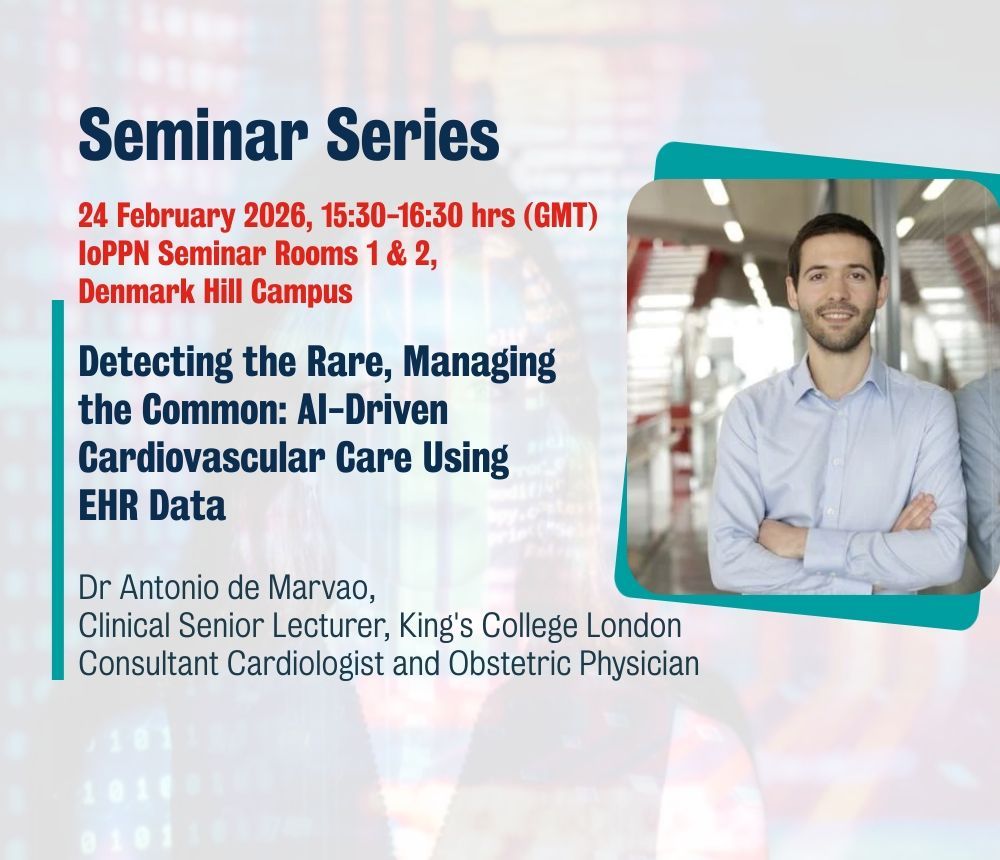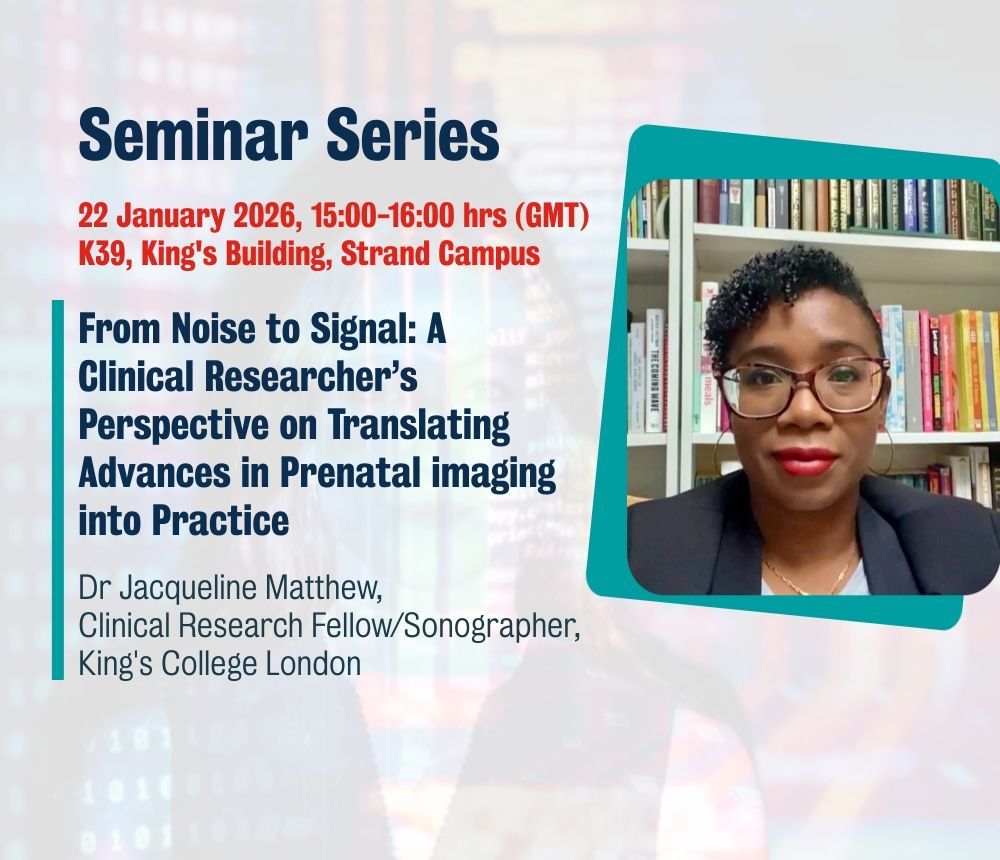Safe, secure and effective deployment of digital health focused technology
January 6, 2025
It was a pleasure to welcome Stuart Harrison from ETHOS, who delivered our first 2025 Seminar Series with his talk,
"Effective deployment of digital health focused technology at scale".
Stuart has led the Clinical Safety movement in the NHS alongside some of the most prominent Clinical leaders for over 20 years. Stuart is now the co-founder & director of ETHOS, a company providing ethical services to the health industry.
Seminar Series Event: "Effective deployment of digital health focused technology at scale"
Date and Time:
15:00 – 16.00, Wednesday 29 January 2025
Location:
The Judy Dunn Room, Social Genetic and Developmental Psychiatry Building, Denmark Hill Campus, Memory Lane, London SE5 8AF
Registration: EPSRC DRIVE-Health students, alumni and wider King's College London research community. Please email
drive-health-cdt@kcl.ac.uk
to register interest.
Abstract: ETHOS will provide insight into the requirements for the safe, secure, and effective deployment of digital health focused technology at scale. Discussions concerning early research problem identification, health system challenges and taking research through to minimum viable product (MVP) and minimum marketable product (MMP). The objective is to highlight the benefit of earlier alignment with regulatory challenges to aid successful interventions and to demonstrate standards can be an enabler not a barrier to innovation.
Stuart Harrison has led the Clinical Safety movement in the NHS alongside some of the most prominent Clinical leaders for over 20 years. Stuart is now the co-founder & director of a company providing ethical services to the health industry. ETHOS Ltd was formed in 2014 as a result of a feasibility study completed in partnership with a large pharmaceutical company in the interests of furthering medical science / MedTech innovation. ETHOS was formed from subject matter experts in the compliance requirements for the NHS covering security, information governance, clinical safety, Medical Devices and General Data Protection Regulations. Stuart’s background is Engineering, particularly safety critical industries where safety has immediate risk to harm to system users or the wider general population. He was one of the original authors of the clinical safety standards.
An expert advisor (BSI UK) international safety, security, and effectiveness standards; leading this area since 2017 and creating a legacy from the widely recognised NHS clinical safety practises into the international health informatics industry. Stuart has significantly contributed to over 1000 health software systems being clinically assured and provided subject matter input to over 3000 service incidents with patient safety impact in the NHS. He led the creation of clinical risk management toolkits to enable self-certification across the industry for low-risk unregulated health software & ensuring they are compatible with new medical device regulations. A specialist advisor to NICE for medical technology and work closely with MHRA and other arm’s length bodies where patient safety and health software initiatives are needed. A steering group member and advisor to many professional institutions and organisations representing digital health; Stuart is helping to influence safety culture and methods across a number of domains. Stuart was co-author of the government’s Regulators Pioneer Fund bid to address the assurance of AI & machine learning in health software. Having successfully facilitated a £1M research grant being awarded to NHS Digital & MHRA. Digital Leader finalist – Digital City Awards 2021. Stuart is currently studying part time for a PhD at the University of Warwick on the subject of clinical decision supporting systems including safety concepts for emerging technology & complementary regulatory frameworks, the inclusion of mobile health data into safer decision making and exploring the lifecycle models of clinical decision supporting systems.
Share

We are pleased to welcome Dr Antonio de Marvao - Clinical Senior Lecturer at King's College London, and Consultant Cardiologist and Obstetric Physician at GSTT and KCH - who will deliver his talk “Detecting the Rare, Managing the Common: AI-Driven Cardiovascular Care Using EHR Data" as part of our Seminar Series. Abstract: Cardiovascular disease encompasses rare inherited conditions and highly prevalent disorders such as hypertension and cardiometabolic disease. Despite differing epidemiology, both require accurate, dynamic and scalable risk stratification. Electronic health records provide longitudinal, multimodal data at population scale. However, their heterogeneity and fragmentation demand advanced artificial intelligence methods to generate clinically actionable insight. Approximately 70 to 80 percent of NHS data exists in unstructured free text, rendering much of the clinically relevant signal inaccessible to conventional analytics without natural language processing or large language models. To address this challenge, we have been developing an AI-enabled framework for real-world cardiovascular risk prediction using integrated EHR data. The approach brings together structured clinical variables, imaging outputs and free-text documentation within secure hospital environments. Natural language processing and large language models are used to transform narrative records into computable features, while chain-of-thought reasoning architectures extract guideline-defined risk parameters directly from routine documentation. This enables automated calculation of established risk scores and dynamic longitudinal reassessment within an agentic workflow. Local, open-source models are evaluated across parameter scales to ensure an appropriate balance between accuracy, safety and computational efficiency for clinical deployment. In inherited cardiac conditions, this approach enables automated extraction of echocardiographic and clinical features required for sudden cardiac death risk prediction, reducing manual burden and supporting real-time monitoring. The same principles extend to hypertensive disorders of pregnancy, facilitating earlier detection, structured surveillance and stratification of long-term cardiovascular risk. Integration of high-resolution EHR-derived phenotypes with genomic and multi-omics datasets further supports progression from risk prediction to biological insight and therapeutic target discovery. Applied rigorously, AI methodologies operating on routine healthcare data provide a scalable foundation for precision cardiovascular care across the life course. Seminar Series Event : “Detecting the Rare, Managing the Common: AI-Driven Cardiovascular Care Using EHR Data" Date and Time: Tuesday 24 February 2026, 15:30 – 16.30 hrs (GMT) Location: IoPPN Seminar 1 & 2, Denmark Hill Campus Attendance: Mandatory for all DRIVE-Health students; a calendar invitation has already been sent. Registration: Alumni and wider King's College London research community all welcome - please email drive-health-cdt@kcl.ac.uk to let us know if you would like to attend. Biography Antonio de Marvao is a Clinical Senior Lecturer at KCL, and a Consultant Cardiologist and Obstetric Physician at GSTT and KCH, specialising in inherited cardiac conditions, maternal cardiology, and hypertensive disorders of pregnancy. His research sits at the intersection of electronic health records (EHR) derived phenotyping, genomics/multi-omics, and cardiovascular imaging, using machine learning to improve risk prediction modelling and personalise care, across the reproductive continuum - from pregnancy to postpartum - and long-term cardiovascular prevention. He leads work within the NHS England Genomic AI Network, applying natural language processing, large language models and multimodal EHR integration to identify patients with inherited cardiovascular disease, streamline specialist review, and improve access to genetic testing and family screening. In parallel, his group also uses AI and EHR data to better define and detect hypertensive disorders of pregnancy at scale, quantify disparities, and enable earlier, more targeted intervention.

We were pleased to welcome Dr Jacqueline Matthew - Clinical Research Fellow/Sonographer at King's College London - who delivered her talk “From Noise to Signal: A Clinical Researcher's Perspective on Translating Advances in Prenatal imaging into Practice" as part of our Seminar Series. Abstract: Over the past decade, machine learning approaches in prenatal imaging has advanced from exploratory academic prototypes to clinically usable, real-time tools, but the path between those two endpoints is rarely straightforward. In this talk, Jacqueline offered a clinical researcher’s perspective on translating biomedical engineering innovations into real-world impact, tracing the journey from the iFIND project’s early breakthroughs in automated fetal imaging to the creation of Fraiya, an AI-driven ultrasound platform now entering clinical deployment. She unpacked the technical, clinical, and regulatory hurdles that shape this trajectory: data acquisition at scale, annotation complexity, model robustness, pipeline optimisation for real-time use, clinical safety engineering, regulatory strategy, and integration with NHS digital ecosystems. Beyond the technical achievements, the session reflected honestly on the innovation “gaps” that researchers and engineers encounter when stepping into entrepreneurship. From productising research outputs, building 'with' clinicians and service users not just 'for' them, securing buy-in, navigating procurement, and proving value in operationally stretched healthcare services. The aim was to provide a pragmatic and motivating roadmap for researchers and innovators seeking to turn biomedical AI research into deployable, sustainable solutions in healthcare. Seminar Series Event : “From Noise to Signal: A Clinical Researcher's Perspective on Translating Advances in Prenatal imaging into Practice. Date and Time: Thursday 22 January 2026, 15:00 – 16.00 hrs (GMT) Location: K39, King's Building, Strand Campus Attendance: Mandatory for all DRIVE-Health students, therefore please accept the calendar invitation. Registration: Alumni and wider King's College London research community all welcome - please email drive-health-cdt@kcl.ac.uk to let us know if you would like to attend. Biography Jacqueline is a clinical academic, sonographer, and MedTech entrepreneur with over 20 years of experience in advancing pregnancy care through compassionate, technology-driven solutions. Specialising in ultrasound and fetal MRI, Jacqueline’s work focuses on leveraging cutting-edge imaging technologies to improve screening, diagnosis, and care for pregnant women. With a PhD in advanced 3D ultrasound and fetal MRI, Jacqueline uses machine learning to refine diagnostic pathways, pushing the boundaries of what’s possible in prenatal care. As Clinical Lead and Chief Medical Officer at an early-stage health tech startup, she has been at the forefront of developing a real-time AI-powered pregnancy ultrasound platform, with ambitions to transform how scans are performed, enhancing diagnostic accuracy, and empowering healthcare professionals to deliver more informed and compassionate care. Jacqueline’s work has earned her widespread recognition, including being named one of the inaugural winners of the NHS England CAHPO Gold Award for Excellence, which celebrates health professionals who exemplify exceptional contributions to healthcare and the NHS values.




